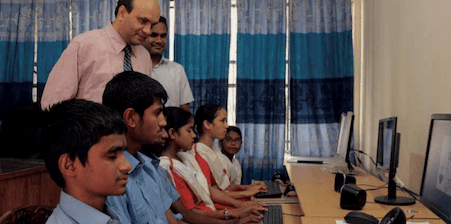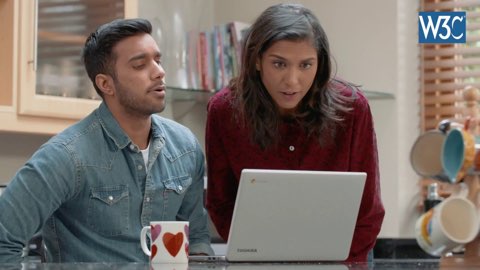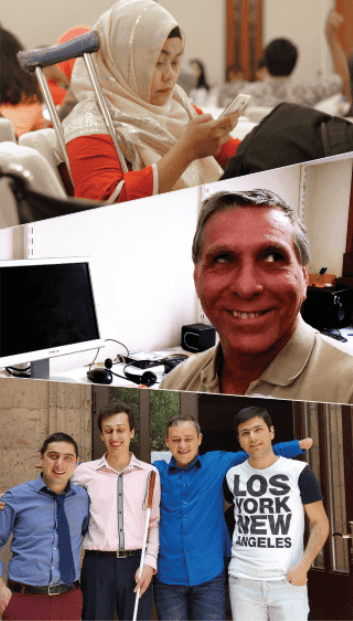Accessibility Toolkit
Linking Internet usage by people with disability to key international policies and programs
”The Internet Society likes to say, “The Internet is for everyone.” This means two things:
Firstly, the Internet must not lock anyone out, because it is intended to include us all. Secondly, the Internet Society needs to keep up its efforts until everybody has the opportunities that the Internet brings to only some of us today.
In doing so, we must accept the fact that people with different abilities have different experiences. With this in mind, our role is more vital than ever, as we strive to ensure the Internet is compatible with all those ways of experiencing the world.
The Accessibility Toolkit, of which this booklet is a part, shines a light on how people with disability use the Internet, the barriers they encounter, and solutions available through national, regional and global policies and programs.
The Internet Society’s Accessibility Special Interest Group is how our community comes together to address these issues, find and share improvements, and keep pushing towards that goal of the Internet for everyone. This is part of making sure that the Internet is a resource to enrich people’s lives, and a force for good in society.
I recommend this booklet to anyone wishing to get a quick overview of global actions to benefit people with disability who are using, or want to use, the Internet.”
Global Accessibility Drivers
International treaties, standards and guidelines promote an inclusive society and act as drivers for improving accessibility.
UN Sustainable Development Goals
The UN urges governments, private sector, civil society—in fact, everyone to take part in building a prosperous society for all.
Goal 4 – Quality education: Guaranteeing equal and accessible education by building inclusive learning environments and providing the needed assistance for persons with disabilities.
Goal 8 – Employment: Promoting inclusive economic growth, full and productive employment allowing persons with disabilities to fully access the job market.
Goal 10 – Social, political and economic inclusion: Emphasizing the social, economic and political inclusion of persons with disabilities.
Goal 11 – Transport: Creating accessible cities and water resources, affordable, accessible and sustainable transport systems, providing universal access to safe, inclusive, accessible and green public spaces.
United Nations Convention on the Rights of Persons with Disabilities (UNCRPD)
Governments that sign and ratify the UNCRPD are obligated to abide by all the Articles. Relevant here are:
Article 9: Accessibility to ICT
Article 21: Access to information
Over 180 governments have ratified the Convention.
UN Disability Inclusion Strategy
UN agencies setting a global example through a policy and accountability framework to accelerate change on disability inclusion.
W3C Web Accessibility Initiative
Guidelines declared by some governments as mandatory.
Web Content Accessibility Guidelines (WCAG) 2.0 – ISO/IEC 40500
Authoring Tool Accessibility Guidelines
User Agent Accessibility Guidelines
Marrakesh Treaty
This treaty by the World Intellectual Property Organisation (WIPO) means that countries that ratify the treaty can make an exemption to their Copyright Act to allow production of books in accessible formats.
Public procurement
ICT accessibility features included in governments’ procurement guidelines encourage suppliers to make their products and services more accessible.
The following guidelines and standards apply:
- USA (Section 508)
- European Union and Australia (EN 301 549)
Universal design for an inclusive world
Seven principles of universal design lead to better design for everyone.
One Story With A Global Context
People with disability across the world strive to overcome barriers and make their community more accessible.
This personal story links with global drivers to achieve an accessible community. Accessibility champions can make this happen in their own countries.
Vashkar Bhattachearjee has a visual impairment and from his own early difficulties learned the importance of accessible textbooks for students with disability.
Encouraging the Bangladeshi government to adopt and implement the globally recognised multimedia DAISY system using open source software means that students with disability have more opportunities for a quality education (one of the UN Sustainable Development Goals).
If the Bangladeshi government ratifies the Marrakesh Treaty, it will mean an even broader selection of accessible books available for Bangladeshis with disability.
Vashkar’s work with the government means that its web portal uses W3C’s Web Content Accessibility Guidelines to make information and services accessible.
The Bangladeshi government has signed and ratified the UN Convention on the Rights of Persons with Disabilities and there is more to be done.

Vashkar Bhattachearjee has a visual impairment and from his own early difficulties learned the importance of accessible textbooks for students with disability.
Encouraging the Bangladeshi government to adopt and implement the globally recognised multimedia DAISY system using open source software means that students with disability have more opportunities for a quality education (one of the UN Sustainable Development Goals).
If the Bangladeshi government ratifies the Marrakesh Treaty, it will mean an even broader selection of accessible books available for Bangladeshis with disability.
Vashkar’s work with the government means that its web portal uses W3C’s Web Content Accessibility Guidelines to make information and services accessible.
The Bangladeshi government has signed and ratified the UN Convention on the Rights of Persons with Disabilities and there is more to be done.
Read Part One, Part Two, and Part Three of Vashkar Bhattacharjee’s story.
Web Accessibility
The W3C Introduction to Web Accessibility video (4 minutes) was produced for the Internet Society Accessibility Toolkit and shows how people with different disabilities use websites and gives tips to make sites more accessible. Take a look at the DAISY Consortium and the Dynamic Coalition on Access and Disability, also working to ensure equal access to information and knowledge.

Making A Difference
The Internet Society has funded disability projects in countries across the world through Beyond the Net. Training in ICT usage, Internet radio programs and accessible publications online are just some of these projects.
Additional support has been provided through the ISIF Asia Award. People with disability have obtained Fellowships to participate in key international meetings. The Internet Society’s Asia-Pacific Bureau has stimulated accessibility programs in the region including Pakistan and Sri Lanka.
Chapters play their part in working with their local communities to foster accessibility. Read more stories.
Building an Internet for Everyone: Celebrating International Day of Persons with Disabilities
Community Snapshot—April
The Regulatory Framework for Accessibility in the European Union
Commemorating the International Day of Persons With Disabilities
Are Your Virtual Meetings Accessible for People with Disabilities? Start with This Checklist
A Step Further in Making Pakistan Digitally Accessible

Everyone Can Contribute.
Individuals and organisations can increase and enhance accessibility to the Internet for people with disability.
Here are some other ways to start:
- Develop technologies that incorporate inclusive design
- Make use of W3C’s Web Content Design Guidelines
- Encourage governments to abide by the Articles of the UN Convention on the Rights of Persons with Disabilities
- Make sure that accessibility is supported at a senior management level
- Incorporate accessibility when developing technical standards and guidelines
- Include people with disability in consultation and decision-making
- Organize disability awareness training in your organisation
- Use guidelines for arranging accessible meetings (online or face-to-face)
- Develop communications materials with accessibility in mind ie captioned videos, clear fonts and good contrast in online and printed material
For questions and comments please contact Gunela Astbrink.
